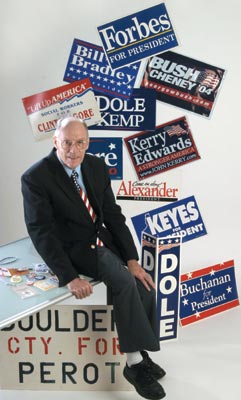
| Prof. Bob Loevy | |
| By Peter Rice '05 |
Signs of the (Political) Times
In 2000, Loevy taught two American Politics & Government (PS 200) courses during the height of the drama, and compared the experience to teaching geology in the middle of an earthquake. “The close election happened during one block. The Supreme Court decision decided the election during the next block. American political history was happening to me and my students,” he says.
 While he follows America’s favorite spectator sport closely, he’s not content just to sit back and talk about it. Before he came to CC in 1968, he worked for U.S. Senator Thomas Kuchel while Kuchel was Republican floor leader for the Civil Rights Act of 1964 and the Voting Rights Act of 1965. Subsequently, Loevy ran (and lost) two races for Colorado Springs City Council. Today, when not teaching American government classes, he can be found consulting for various campaigns, serving on city committees, and after Election Day, prowling around town for interesting campaign lawn signs to add to his impressive collection…
While he follows America’s favorite spectator sport closely, he’s not content just to sit back and talk about it. Before he came to CC in 1968, he worked for U.S. Senator Thomas Kuchel while Kuchel was Republican floor leader for the Civil Rights Act of 1964 and the Voting Rights Act of 1965. Subsequently, Loevy ran (and lost) two races for Colorado Springs City Council. Today, when not teaching American government classes, he can be found consulting for various campaigns, serving on city committees, and after Election Day, prowling around town for interesting campaign lawn signs to add to his impressive collection…
Q: A few years from now, what will you remember about 2004?
A: The way in which only one state, Iowa, determined the Democratic nominee for President.
Q: What can we expect from a second Bush term?
A: The continuation and expansion of the ideologically conservative policies that Bush pursued in his first term in the White House. He’ll send very conservative judicial nominations to U.S. courts, limit stem cell research, verbally oppose abortion, make a political principle of cutting taxes, etc.
Q: How do you like teaching politics to CC students?
A: American Politics and Government is my favorite course. The subject matter keeps changing as national events occur; thus you always have fresh facts and ideas to present to students.
Q: What is it about politics that really gets you going?
A: Elected officials are the aristocracy in a democracy. They determine how other people live, and they have much to say over the direction taken by society. The stakes are high and the effects far-reaching, which makes politics more than a spectator sport.
Q: What’s the biggest change in the American political landscape you’ve noticed over the years? A: The most important change over the course of my teaching career has been the progressive shift of white Southern voters from the Democratic to the Republican Party.
Q: Haven’t some of your students gone on to do politics for a living?
A: My two most successful students at the ballot box have been U.S. Congresswoman Diana DeGette, D-Colo., and Joe Simitian, a state representative in California. I am also proud of students who have pursued judicial careers, such as Tim Timkovich (U.S. district court judge in Denver) or gone into government service, such as Robert Lackner (staff attorney for Colorado Legislative Legal Services).
Q: Do you have a favorite campaign sign?
A: A hand-painted “Boulder County for Perot” sign from Ross Perot’s 1992 third-party campaign for President (left).
Q: If you could ask a question of any president living or dead, what and who would it be?
A: Richard Nixon: Why did you ruin a very successful presidency by getting yourself into the Watergate mess?
The Colorado College | 14 East Cache La Poudre Street | Colo Sprgs, CO | 80903 || 719-389-6000